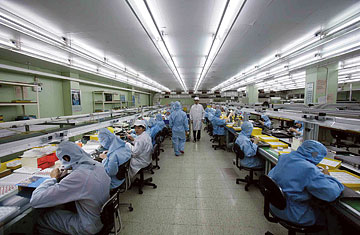
The Dailywin Watch factory, above, moved into higher-technology products and production methods to maintain profits
(2 of 3)
There are ways that corporations, economies and countries can cope with such changes. Improving worker productivity is one: by modernizing manufacturing methods, factories can churn out more product using fewer workers, thus preserving profit margins. Profits can also be protected by making and selling higher quality, more expensive goods. Indeed, Asia's tigers to one degree or another have all moved up the commercial food chain to offset higher costs by advancing into sophisticated, value-added products and services such as cars, high-tech gear and financial services.
China is headed in the same direction, and the government is doing a lot of the driving. Stung by criticism that its factories churn out shoddy merchandise and tainted food, officials in Beijing want to improve the quality and reputation of the country's exports. This task is all the more urgent because the Chinese people are growing increasingly angry over the environmental degradation and social inequity that have been byproducts of the country's breakneck growth. Beijing realizes its manufacturing sector needs to adopt higher standards and better spread the benefits of the economic boom to the working class. The bureaucracy's instrument in achieving these goals has been blunt: a slate of reforms aimed at forcing the country's low-end factories to clean up their acts. Tighter pollution regulations are pressing companies to invest in expensive new machinery and improve their waste-management systems. Stringent labor laws, implemented this year, mandate overtime and severance pay, and restrict companies' ability to lay off workers. The laws provide far more protection to employees, but Credit Suisse estimates they add 15-20% to the cost of running a labor-intensive factory. These reforms are putting some cash-starved manufacturers out of business. Better-capitalized companies are investing in advanced technologies and improved product lines. Beijing's officials "are thinking that [regulatory reforms] move people up the value chain," explains Alex Fong, chief executive of the Hong Kong General Chamber of Commerce. "They have looked at history and learned from it, and are trying to apply it to China."
Eddie Leung, founder of Hong Kong watchmaker Dailywin Watch Products, says he thinks Beijing's campaign is having the desired effect. Leung opened his factory in Dongguan in 1989 in search of lower labor costs. Today his 650 workers churn out 200,000 watches a month for brands such as Tommy Hilfiger and Anne Klein. Over the past 12 months, China's new labor laws, higher fuel prices and currency appreciation have increased his costs by about 30%, Leung says. He's responding by adjusting his product mix and improving production methods. Earlier this year, he installed an advanced clean room in his factory — similar to those used in semiconductor plants to keep out dust — for assembling pricier precision watches. He added machines used to clean charms for watch bracelets that are 60% faster than manual labor alone. In all, Leung says greater automation and other changes have boosted his output by 8% even though he has reduced his staff by some 30 workers, and more upgrades are planned. "If it wasn't for the government policy," Leung says, "I might be doing my business the same as two years ago."
Not every factory owner, however, has been able to adjust. Beijing's reforms have kicked in at just the wrong time. A global economic slowdown is curtailing orders for the region's consumer goods. Facing a double whammy of higher costs and slower sales, thousands of low-end Guangdong factories are on the verge of failure. The region is essentially one big industrial park with tens of thousands of factories connected by dusty roads packed with trucks. But closures are starting to leave scars in cities such as Dongguan. A short drive from the Dailywin plant, a former plastics factory stands abandoned, with refuse stacked up in its courtyard. Down the road, a watch factory, though still operating, has vacated two-thirds of its plant. A loudspeaker at the gate endlessly repeats a recorded message seeking a new tenant for the building.